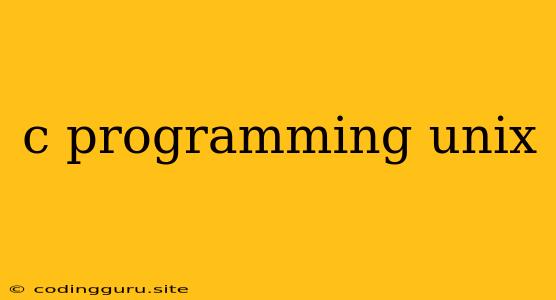Unlocking the Power of C Programming in the Unix Environment
The C programming language has long been a staple for developers working in the Unix environment. Its versatility, efficiency, and close ties to the underlying operating system make it an ideal choice for a wide range of tasks. But how can you leverage its power to create powerful applications? Let's dive into the key aspects of C programming and its connection to the Unix world.
Why Choose C for Unix Development?
C programming is the language that Unix was essentially written in. This tight integration gives you direct access to the system's internals, allowing you to build highly efficient and low-level applications.
Here are some key benefits of choosing C programming for Unix development:
- Performance: C is renowned for its speed and efficiency. It allows you to optimize your code for performance-critical tasks, making it ideal for system-level applications.
- Control: With C programming, you have fine-grained control over system resources, memory management, and hardware interaction.
- Portability: C code is highly portable, meaning you can often compile and run it on different Unix-based systems with minimal modifications.
- Rich Libraries: The Unix environment offers a vast collection of libraries that provide ready-made functionality for tasks like file system operations, networking, and more.
Exploring the Unix Environment with C
Let's explore some of the fundamental concepts that bring C programming and Unix together:
- Standard I/O: The
stdio.hlibrary provides a set of functions for working with input and output. This allows you to read data from the console, write to files, and interact with other processes. - File System: The
sys/stat.handsys/types.hheaders offer functions for file operations like creating, deleting, renaming, and accessing file attributes. - System Calls: These functions, defined in
unistd.h, allow you to directly interact with the kernel. This includes tasks like process management, memory allocation, and inter-process communication.
A Practical Example: File Operations
Let's create a simple C programming example that demonstrates file operations in Unix:
#include
#include
#include
#include
#include
int main() {
// Create a file
int fd = open("my_file.txt", O_CREAT | O_WRONLY | O_TRUNC, 0644);
if (fd == -1) {
perror("Error creating file");
exit(1);
}
// Write data to the file
char *data = "This is some data written to the file";
write(fd, data, strlen(data));
// Close the file
close(fd);
printf("File created and data written successfully.\n");
return 0;
}
This code snippet creates a file named my_file.txt, writes some data to it, and then closes it. The open() function opens the file with the specified flags. The write() function writes the data to the file, and the close() function closes the file handle.
Key Libraries for Unix Development in C
Here are some crucial libraries that every C programming developer in the Unix world should be familiar with:
stdio.h: Standard input/output operations like reading from the console, writing to files, and formatting data.stdlib.h: Provides functions for memory allocation, random number generation, and string conversion.unistd.h: System calls for process management, file system operations, and signal handling.string.h: Functions for working with strings like copying, comparing, and searching.math.h: Mathematical functions like trigonometric operations, logarithmic calculations, and more.time.h: Functions for working with dates and times.
Building and Running C Programs in Unix
To build a C programming program in Unix, you'll typically use a compiler like gcc. Here's a basic workflow:
- Create your C source file: Save it with a
.cextension (e.g.,my_program.c). - Compile your program: Use the command
gcc my_program.c -o my_programto compile and create an executable namedmy_program. - Run the program: Simply type
./my_programto execute the compiled file.
Tips for Effective C Programming in Unix
Here are some tips to enhance your C programming experience in the Unix environment:
- Utilize the man pages: The
mancommand is your best friend. Typeman <command>orman <function>to access detailed documentation. - Leverage the
makeutility: Usemaketo automate the build process, especially for larger projects. - Use debugging tools: Tools like
gdb(GNU Debugger) can help you identify and fix errors in your code. - Learn about signals: Signals allow your programs to respond to events like interrupts and errors.
Conclusion
C programming and the Unix environment are a powerful combination for building efficient, robust, and low-level applications. Mastering the fundamental concepts and libraries discussed here will empower you to take full advantage of this robust ecosystem.
Remember, C programming is a versatile language with endless possibilities. By understanding its strengths and the capabilities of the Unix world, you can unlock a vast array of opportunities in system programming, network development, and more.
